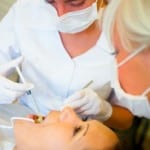 A trip to the dentist can make anyone feel nervous and we understand that many of our patients feel anxious when they are preparing to undergo dental treatment. We offer sedation as a means of making treatment less stressful for patients and enabling them to go through treatment without feeling any pain.
A trip to the dentist can make anyone feel nervous and we understand that many of our patients feel anxious when they are preparing to undergo dental treatment. We offer sedation as a means of making treatment less stressful for patients and enabling them to go through treatment without feeling any pain.
What is sedation?
Sedation is a technique, which we use to make patients feel completely relaxed when they have treatment. Sedation is not the same as general anaesthetic and it doesn’t make lose consciousness; instead, it induces a profound state of relaxation. Once sedative medication takes affect, you won’t feel any pain, but you will be aware of your surroundings still; you can talk to your dentist if you want to and you’ll be able to hear them.
After sedation, it’s likely that you’ll feel a little sleepy and drowsy and it will take a few hours for the effects of the sedative to wear off fully. You won’t need to stay after treatment and we recommend asking a friend or family member to take you home and stay with you. Most people don’t remember much about the procedure when they have been sedated.
Who can benefit from sedation?
Sedation is highly beneficial for nervous patients because it helps them to feel calmer before and during treatment. It is also advantageous for patients who are having a long or complex procedure and those who struggle with fears, such as a fear of the dental drill or needles.
We also find that many patients who struggle with a sensitive gag reflex find sedation beneficial.
If you’re a nervous patient and you are worried about having dental treatment, we can promise you that you’re in the best hands at City Dental Leeds. Our friendly team is here to help and we use all the latest techniques to ensure that you feel completely comfortable. Call us today to find out how we could help you.















